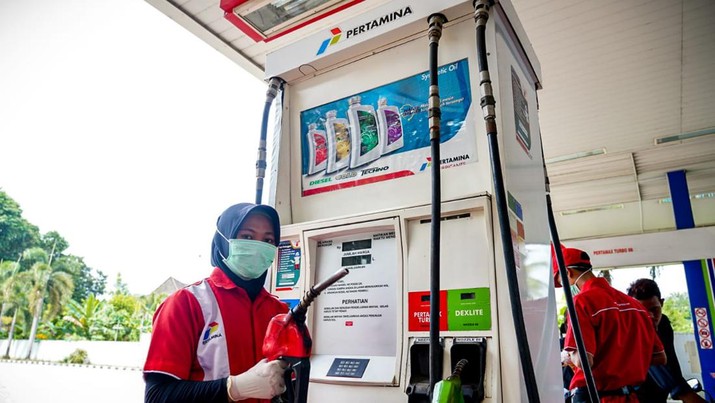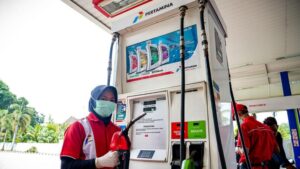

opensourcesupportdesk, Jakarta – Get ready to fill up your tanks with a sigh of relief! Airlangga, the Minister of Energy and Mineral Resources in Indonesia, has made a bold promise that will alleviate the worries of many. The fuel prices are set to remain stable until June, bringing peace of mind to both industry players and consumers alike. Let’s delve into the details behind this reassuring declaration and understand its implications for the nation’s economy.
Explanation of the current fuel price situation in Indonesia
The current fuel price situation in Indonesia has been a topic of concern for many citizens and businesses alike. With global oil prices constantly fluctuating, it directly impacts the local fuel market. The Indonesian government heavily subsidizes fuel to keep prices stable for consumers. However, any sudden increase in international oil prices can put pressure on maintaining these subsidies.
In recent months, geopolitical tensions and supply chain disruptions have caused oil prices to rise unpredictably. This volatility adds complexity to managing domestic fuel costs. Despite efforts by policymakers to stabilize the situation, external factors continue to play a significant role in determining future pricing trends.
Consumers are closely monitoring any potential changes in fuel prices as it directly affects their daily expenses and overall cost of living. The government’s proactive measures are crucial in ensuring that fuel remains affordable for all sectors of society amidst economic uncertainties and challenges ahead.
Factors that may affect future fuel prices
As we look ahead to the future of fuel prices in Indonesia, several factors come into play that could potentially influence the cost at the pump. One critical aspect is global oil production and supply, which can be impacted by geopolitical tensions or natural disasters. Fluctuating exchange rates may also affect fuel prices as Indonesia imports a significant portion of its oil.
Domestic policies and regulations surrounding fuel subsidies and taxes can directly impact pricing. Additionally, changes in demand due to economic growth or shifts towards alternative energy sources could have ripple effects on fuel costs. Climate events like hurricanes or droughts might disrupt oil refining processes, leading to price volatility.
It’s essential to keep an eye on these various elements that interact in complex ways to determine how they might shape the trajectory of fuel prices moving forward.
Airlangga’s plan to maintain stable fuel prices until June
Airlangga, the Minister of Energy and Mineral Resources in Indonesia, recently announced a bold plan to ensure that fuel prices remain stable until June. This move comes amidst global economic uncertainties and rising energy costs. Airlangga’s proactive approach aims to provide relief to consumers and businesses who heavily rely on affordable fuel for their daily operations. By implementing strategic measures and closely monitoring market trends, Airlangga is committed to keeping fuel prices steady throughout the upcoming months. His dedication to safeguarding the economy from sudden spikes in fuel costs demonstrates strong leadership and foresight in navigating challenges effectively.
With Airlangga at the helm, Indonesians can have confidence in a transparent pricing mechanism that prioritizes stability and affordability. The Minister’s assurance of price consistency until June brings much-needed reassurance during these uncertain times for both individuals and industries alike. As we look ahead with optimism towards a future of economic resilience, Airlangga’s unwavering commitment to maintaining stable fuel prices sets a promising tone for sustained growth and prosperity across Indonesia.
Reactions from industry experts and citizens
Industry experts have cautiously welcomed Airlangga’s guarantee on fuel prices until June. Many view this move as a temporary relief for businesses grappling with rising operational costs. Some analysts highlight the need for long-term solutions to stabilize fuel prices beyond the promised period.
Citizens, on the other hand, have expressed mixed feelings about the announcement. While some appreciate the certainty it provides in budget planning, others remain skeptical about potential price hikes post-June. Social media platforms buzz with discussions ranging from optimism to skepticism regarding the government’s ability to sustain these price levels. Both industry experts and citizens are closely monitoring developments in fuel pricing policies and their broader implications on economic stability.
Impact on the economy and consumers
The announcement by Airlangga regarding the stability of fuel prices until June has brought a sense of relief to both the economy and consumers in Indonesia. With fuel costs being a significant factor in many industries, this guarantee provides businesses with some much-needed predictability in their budgeting and planning. Stable fuel prices can also have a positive impact on inflation rates, as transportation costs are often reflected in the prices of goods and services. This could potentially help curb price hikes across various sectors, easing financial burdens on everyday consumers.
Moreover, consistent fuel prices until June may lead to increased consumer confidence and spending. When people feel more secure about their expenses, they are likely to be more willing to invest in purchases beyond essential items, stimulating economic growth.
Airlangga’s commitment to maintaining stable fuel prices sends a reassuring signal to both businesses and consumers alike during these uncertain times.
Conclusion
Airlangga’s commitment to keeping fuel prices stable until June provides a sense of relief for both the industry experts and citizens in Indonesia. With potential factors that could impact future fuel prices, such as global oil trends and geopolitical situations, Airlangga’s plan offers a level of predictability and stability for consumers and the economy. This assurance not only benefits individuals by maintaining their purchasing power but also contributes to overall economic stability in 2024. As we look ahead, Airlangga’s proactive approach serves as a beacon of hope amidst uncertain times, demonstrating leadership in managing critical aspects of the nation’s economy.





